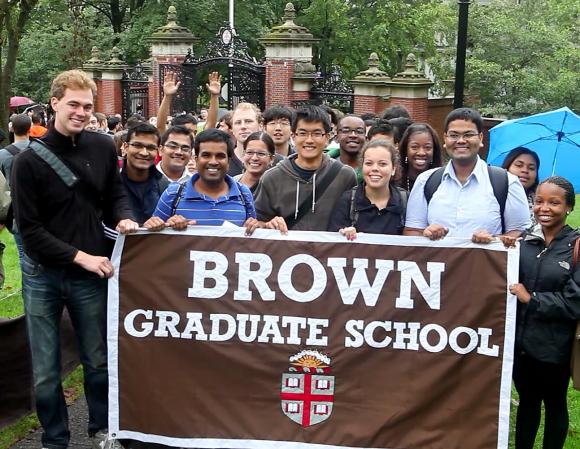PROVIDENCE, R.I. [Brown University] — A $2-million grant from the Andrew W. Mellon Foundation will enable the Brown University Graduate School to launch “Open Graduate Programs: Graduate Education - Uniquely Brown,” a pilot program allowing doctoral students to pursue a master’s degree in a secondary field while they earn their doctorates.
Over six years, Open Graduate Programs will give 24 doctoral students from any humanities or humanistic social science department the opportunity to pursue a master’s degree in a different discipline at Brown, including physical and life sciences and engineering. Additionally, doctoral students from any discipline can pursue a master’s degree in a humanities or humanistic social science field. Brown graduate students currently have five years of full financial support and health insurance; the Mellon grant will provide an additional year of support. Students will have to apply to participate. The first cohort will begin in the 2012-13 academic year.
The program is part of a larger pilot initiative to allow a total of 48 doctoral students from any discipline at Brown to pursue a master’s degree in any other discipline offered by the University. Peter Weber, professor of chemistry and dean of the Graduate School, says that Open Graduate Programs will broaden Brown graduate students’ education, catalyze new interdisciplinary pursuits, and prepare students for the demands of the current job market. Graduate students already enjoy the latitude to pursue interdisciplinary scholarship, but this program expands and formalizes the opportunity. The program also more closely aligns the Graduate School with the spirit of Brown’s open undergraduate curriculum, a cornerstone of the University’s pedagogy.
“We envision an institutional transformation where a large number of students engage in multidisciplinary intellectual discourse, imparting Brown’s uniquely open education onto our graduate students,” said Weber. “We hope this new approach will establish a distinctive identity for Brown at the graduate level and attract exceptionally able and innovative students who seek an alternative to the more bounded forms of doctoral training.”
The Graduate School
In the last decade, the number of applications to Brown’s advanced-degree programs has more than doubled to over 9,000 in 2010-11. Under Brown’s Plan for Academic Enrichment, launched in 2002, the Graduate School has expanded its faculty, student body, and program offerings, adding more than 12 new degree programs through internal initiatives and partnerships with external institutions and organizations. The Graduate School now offers more than 70 degree programs to Brown’s nearly 2,000 full-time master’s and Ph.D. students.
The Mellon award comes as Brown is reaffirming its commitment to the humanities with the Brown Humanities Initiative, announced in October 2010. In addition to creating positions for six renowned scholars of the humanities, the initiative will provide funding for collaborative programming, multidisciplinary graduate research, and new coursework. Among the new programs aimed at expanding teaching and research in humanistic fields is “Brown in the World/The World at Brown,” launched earlier this year by a $498,000 grant from the Mellon Foundation. Based at the Cogut Center for the Humanities, the program provides future scholars and professors of the humanities with international exposure and the opportunity to enhance their global perspectives and networks.

